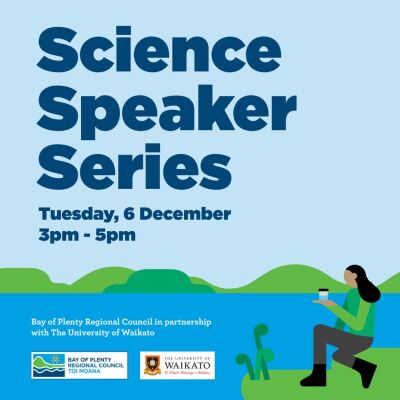
29 November 2022
Topics to be covered at an upcoming Science Speaker Series event will range from scent-detection dogs trained to identify pest fish species to the science behind algal blooms. These subjects, and more, will highlight the growing research into issues faced by the Te Arawa lakes.
Hosted by Toi Moana Bay of Plenty Regional Council in partnership with The University of Waikato, the Science Speaker Series consists of four presenters from the University of Waikato and will be held on Tuesday 6th December from 3-5pm. It will be both in-person and via webinar for anyone to tune in from anywhere.
Helen Creagh, Rotorua Catchments Manager for Bay of Plenty Regional Council, is excited to offer the event to the public for the first time in two years.
“We’re so lucky to have access to these world-class speakers who are at the top of their game. It’s all about giving the public a chance to really engage with the science behind our work in a way that everyone can understand and connect with.”
Four guest speakers from from the University of Waikato will present their research into issues faced by the Te Arawa lakes. Deniz Özkundakci, Associate Professor and Toihuarewa Waimāori, Bay of Plenty Regional Council Chair in Lake and Freshwater Science, says the event couldn’t come at a more pressing time.“Climate change is already affecting the Rotorua Te Arawa lakes. Understanding how we can move forward together to tackle these issues is the first step to planning for the future. If we want to see positive change in the health of our lakes, we must understand what we’re facing. Everyone has a part to play.”
Deniz is also a keynote speaker and will be presenting his research toward better understanding climate impacts on the Rotorua Te Arawa lakes. His talk will outline the complex interplay of fragile freshwater ecosystems and climate changes, the ongoing and future climate impact research at the University of Waikato and the effects of climate change on lake restoration outcomes.
Meti Yulianti, Doctor of Philosophy (Ph.D.) student, will share on her research into identifying control points for freshwater contaminants in Te Arawa lake catchments. She’ll discuss her investigation into the characteristics of nutrients in streams flowing into Lake Ōkaro by integrating isotope tracer and catchment modelling.
Dr. Grant Tempero will discuss his work around phytoplankton nutrient limitation in Lake Rotorua and the control of algal blooms. He’ll discuss results from a laboratory trial to assess nutrient availability for algae, along with insights into the nutrient status of Lake Rotorua and how environmental factors drive cyanobacteria blooms.
Dr. Clare Browne will delve into her work around detecting invasive freshwater fish using scent and environmental DNA. Scent-detection dogs have proved extremely useful in terrestrial conservation and biosecurity but using their detection accuracy for aquatic species is a new approach. Dr. Browne and her team have worked to compare the ability of dogs trained to identify the odour of carp and catfish from water samples to that of eDNA, and it is looking promising.
You can tune into the event via webinar or attend in-person at the Bay of Plenty Regional Council Rotorua offices at 1118 Fenton Street. To receive a link to the event or to RSVP for in-person attendance please email: Rotorua.Lakes@boprc.govt.nz
For more information visit (Facebook) https://www.facebook.com/loveourrotorualakes or rotorualakes.co.nz